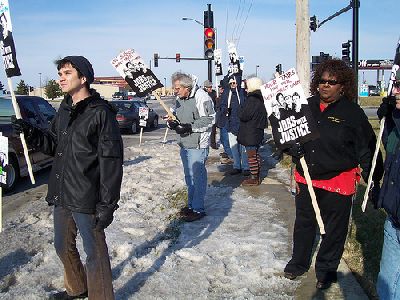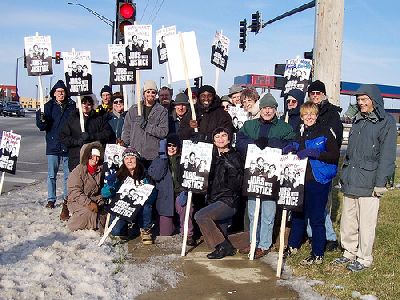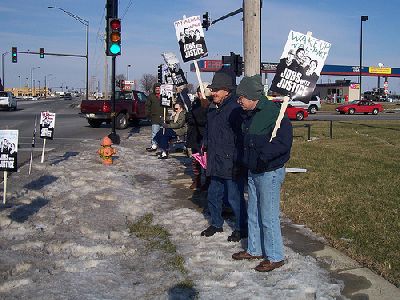|
Comment on this article |
View comments |
Email this Article
|
|
News :: Protest Activity |
|
Pickets to greet Urbana Wal-Mart at grand opening |
Current rating: 0 |
by Ricky Baldwin
Email: baldwinricky (nospam) yahoo.com (verified)
Phone: 217-328-3037 |
20 Jan 2006
Modified: 05:54:28 PM |
|
The second picket of a local Wal-Mart store this winter greets the Urbana store on its grand opening January 31 at 3pm. Polls show a decline in public opinion of the store, and legislative actions and lawsuits are increasing. To join the local effort call 344-3354 or email cu_jwj_forming (at) mail.com. (Photo of Dec. 17 picket at Champaign Wal-Mart) |
Click on image for a larger version  |
(Urbana) Energized by the enthusiastic response to their Dec. 17 picket at the Champaign Wal-Mart, area residents are planning a second informational picket to coincide with the new Urbana store’s grand opening January 31.
The informational picket begins at 3pm in front of the new Urbana Wal-Mart on Tatman Court off Highcross Road.
Organizers of the local effort report widespread anger at the retail giant, even before recent showings of a particularly damning documentary on Wal-Mart’s anti-social practices. And nationwide the chain’s image has been slipping. A new Zogby poll, conducted in November, showed Americans expressing much more negative opinions of Wal-Mart than the year before.
Slip-sliding away
The poll found that 56 percent of American adults agreed with the statement: "Wal-Mart is bad for America. It may provide low prices, but these prices come with a high moral and economic cost." On the other hand, only 39 percent of American adults agreed with the opposite statement: "I believe Wal-Mart is good for America. It provides low prices and saves consumers money every day."
The Zogby poll, commissioned by WakeUpWalMart.com, was a national telephone survey of 1,012 adults conducted by Zogby International and had a margin of error of +/- 3.2 percent.
Some reports claim the corporation is feeling the pinch in its accounts. Certainly it has been forced to spend a ton of cash on PR, including at least two image makeovers.
In the past year, Wal-Mart has lost battles to build stores in Inglewood, California, Chicago and New York City, notes the Washington Post. In addition, “dozens of local governments -- including Calvert, Prince William and Montgomery counties in the Washington region -- have passed zoning rules making it difficult for Wal-Mart to pursue its plans.”
And some of the more popular complaints, particularly over the corporation’s abysmal health insurance plan, have gotten the attention of state legislatures concerned about footing the bill for Wal-Mart’s employee neglect through public services.
A new Maryland law that would “effectively require Wal-Mart to boost spending on health care,” as the Post put it, is “a direct legislative thrust against a corporate giant that is already on the defensive on many fronts nationwide.”
Maryland lawmakers told the press they did not intend to single out Wal-Mart when they drafted the bill (it requires organizations with more than 10,000 employees to spend at least 8 percent of their payroll on health benefits or to put the money directly into the state's health program for the poor.) But it turns out Wal-Mart is the only violator.
Wal-Mart of course vows to fight the bill all the way to the US Supreme Court if necessary. If the Maryland bill stands, it would likely inspire other state legislatures, also feeling the drain of funds from state budgets to pay for health care Wal-Mart doesn’t provide.
Wal-Mart’s own records show that nationwide less than 48 percent of its 1.3 million employees are covered by the expensive and restrictive company health care plan. Wal-Mart employee Lance Hindman describes the company plan as “lousy.” Another employee, Rosetta Brown calls it “gimmick insurance”. She says, “Immunizations? Not covered. Well-child care? Not covered. Preventative care? Guess what? Wal-Mart doesn’t cover that either.”
Many of the remaining 600,000 employees are on Medicaid. In fact, in eleven out of twelve states that report employers for having employees on Medicaid, Wal-Mart leads the pack.
The estimated total of federal aid for which Wal-Mart employees are eligible is $2.5 billion, according to Harper’s Magazine (March 2005).
“Efficiency”
“Many of our competitors, let's face it, would like to continue to be rewarded for operating in ways that are less efficient,” said Wal-Mart CEO H. Lee Scott Jr, responding to criticism of the company. He noted that Wal-Mart’s business practices are what allow the multibillion dollar retailer to offer low prices, which Scott says benefit working families.
Just not the ones who work there.
The latest wage figures Wal-Mart has released for many occupations at their stores suggest that sales associates, the most common job at Wal-Mart, earn an average of $1000 a year below the federal poverty level for a family of three. Also, the national median family budget in the United States for a two-person family (one parent and one child) in 1999 was $23,705, well above the average associate's annual wages of $13,861.
These low wages qualify large numbers of Wal-Mart employees for welfare. Add to this the public cost in health care neglect and the local and state subsidies that many Wal-Mart operations receive (at least one-third according to the CEO). Economists estimate that one Wal-Mart store with 200 employees costs American taxpayers up to $420,750 a year, or $2,103 per employee.
This then, is the Wal-Mart definition of “efficiency”: get the state to pay the cost of doing business.
Even that is not enough, however. According to Wal-Mart’s most recent annual report, Wal-Mart faced 44 wage and hour lawsuits in 2005. Major law-suits have either been won or are working their way through the legal process in California, Indiana, Minnesota, New Jersey, Oregon, Washington and other states.
Among the retail monster’s violations are gender discrimination, child labor law violations, forcing “associates” to work off the clock, using undocumented workers, firing employees for attempting to start a union, threats and illegal surveillance, blocking emergency exits and denying lunch breaks to employees.
Since 1995, the U.S. government has been forced to issue at least 60 complaints against Wal-Mart at the National Labor Relations Board.
As if to justify its impact on communities, running thousands of small businesses into the ground and so on, the Arkansas-based corporation has made an image for itself over the years as an “American” store offering “American” products. In fact, Wal-Mart imports much of its fare from China and other super-low-wage environments, as if underpaying its US workers and relying on various public subsidies was not enough.
One report from China’s Guangdong Province found that workers who made toys for Wal-Mart worked as much as 130 hours per week for wages averaging 16.5 ¢ per hour (below the minimum wage) and no health insurance (National Labor Committee, “Toys of Misery,” Feb. 2004). In another report, striking workers at a factory that supplies Wal-Mart in Shenzhen, China said they had to work 11 hour days, including mandatory 3 hours of overtime. “Half of their small wages were deducted to pay for accommodation in company dormitories,” (New York Times, 16 Dec. 2004).
Other Wal-Mart products are assembled in maquiladoras in countries such as Haiti, where government and rightwing military thugs regularly attack and sometimes kill workers who attempt to improve working conditions in these sweatshops. This, we must suppose, is the ultimate in business “efficiency”. But do we want it? |
Click on image for a larger version  |
Click on image for a larger version  |
See also:
http://WAKEUPWALMART.com
|
Related stories on this site:
Judge: Wal - Mart Workers Can Sue Over Hours
What Is a Living Wage?
Wal-Mart’s Unionbusting Practices Face Scrutiny in U.S. Courts and in the Online Court of Public Opinion
|

This work is in the public domain |
|
Re: Pickets to greet Urbana Wal-Mart at grand opening |
by Ironic
(No verified email address) |
Current rating: 0
20 Jan 2006
|
|
I wonder if you're paying the pickets a living wage and providing health benefits? |
|
Re: Pickets to greet Urbana Wal-Mart at grand opening |
by Ricky Baldwin
baldwinricky (nospam) yahoo.com (unverified) |
Current rating: 0
21 Jan 2006
|
Ironic,
Who's paying YOU to write this stuff? |



